2023 Honda HR-V Review and Test Drive
Honda improves the redesigned 2023 HR-V in some ways but not in others.
Capital One
Small SUVs of the more affordable, subcompact variety are exploding in popularity. Honda has offered one to its U.S. customers since the 2016 model year when the first HR-V arrived to address buyers with tighter budgets who wanted to drive an SUV instead of a car. Despite its age, the previous-generation HR-V set sales records during its final year of availability.
Now, a redesigned 2023 Honda HR-V is on sale, offering numerous improvements intended to keep it competitive with newer rivals in the segment. Additionally, Honda tasks the next-generation HR-V with retaining the model’s position as one of the most popular small SUVs in America. According to the automaker, Honda is the top brand choice for first-time, Gen Z, and Millennial car buyers, so it designed the new 2023 HR-V to appeal to the “young, active” people who fit that description.
As such, the new 2023 HR-V is more technologically advanced and stylistically sophisticated than before. It is also more powerful but heavier and is roomier for people but not cargo. Inside and out, the new HR-V adopts a more mature and modern appearance, but along the way, it also loses some of the personality and packaging that made it special. If this sounds like a mixed bag of benefits, it is. But based on a week spent driving the new HR-V, I think the typical target buyer will be pleased with nearly every aspect of the SUV.
Honda offers the 2023 HR-V with front-wheel drive (FWD) or all-wheel drive (AWD), and it comes in three trim levels: LX, Sport, and EX-L. Prices range from the mid-$20,000s to the low $30,000s, including the $1,245 destination charge to ship the SUV from the Celaya, Guanajuato, Mexico factory that builds it before delivery to your local dealership.
For this 2023 Honda HR-V review, we test-drove the EX-L with all-wheel drive in Southern California. It came with extra-cost Nordic Forest paint and a Manufacturer’s Suggested Retail Price (MSRP) of $30,590, including the $1,245 destination charge. Honda provided the vehicle for this HR-V review.
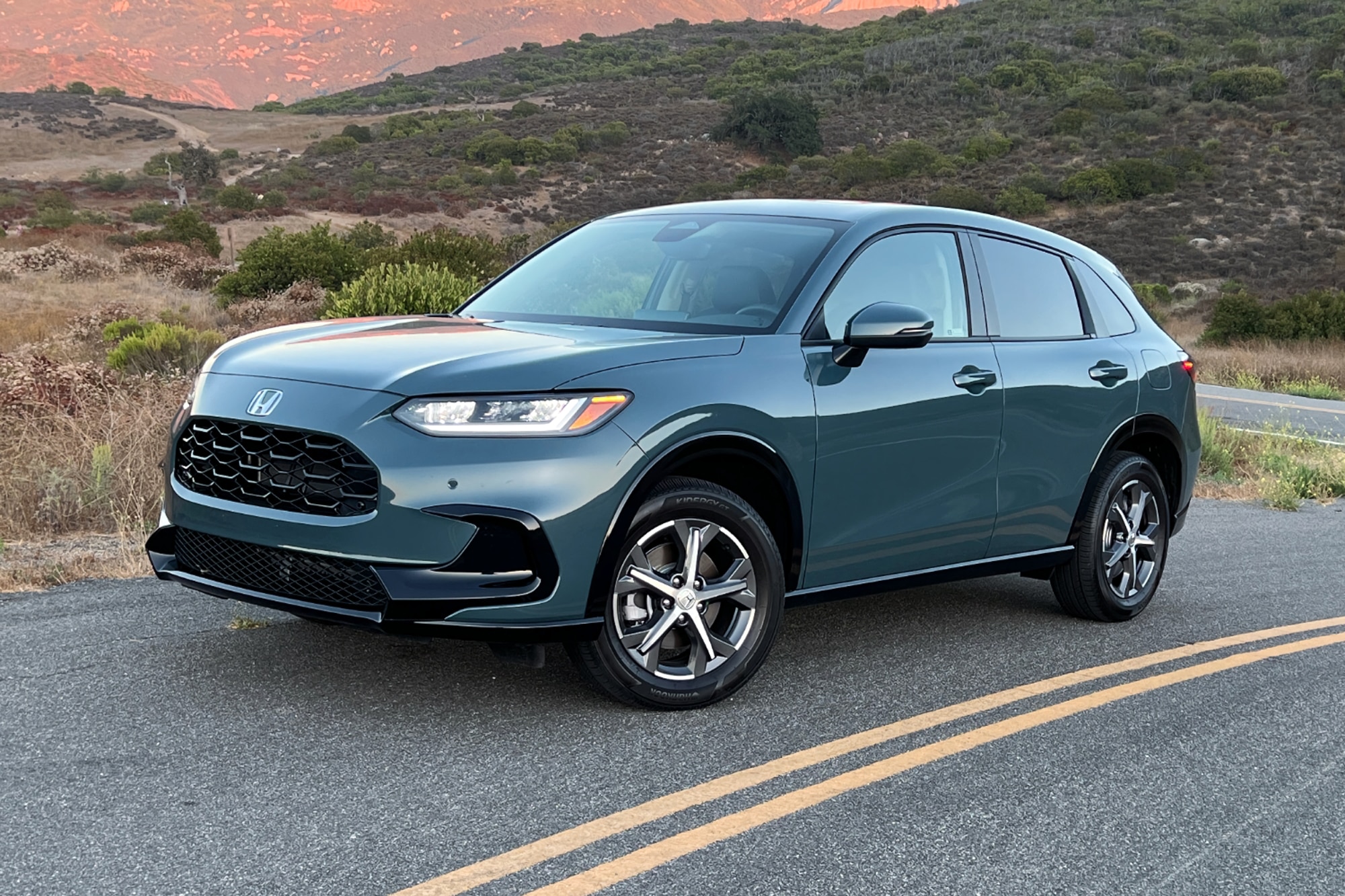 Christian Wardlaw
Christian Wardlaw
2023 Honda HR-V Review: The Design
Say what you will about the previous-generation HR-V’s distinctive styling, but the jaunty little SUV had undeniable personality. Comparatively, the new 2023 HR-V displays a more conventional design devoid of the original’s inventive details. Derivative shapes and forms make it hard to identify on sight; remove the Honda badges, and it could be any SUV from any automaker.
Open the new HR-V’s front doors, and you’ll find an interior design patterned after the latest Honda Civic, but with rounded, swollen organic shapes defining the center console and armrests. Based on the EX-L’s cabin, Honda uses abundant soft-touch materials, including the front upper door panels and padded areas where your legs are most likely to contact cabin surfaces.
Metal mesh dashboard trim deftly hides the air vents, and the HR-V EX-L pairs a 9-inch touchscreen infotainment display with a 7-inch digital instrumentation panel for a clean, modern appearance. The control layout is sensible and logical, and the knurled metal knobs for the stereo volume and dual-zone automatic climate control system add plenty of class to the cabin. Practical storage space is good, especially within the bin under the padded center armrest, which is larger than what you’ll find in many HR-V rivals.
Front-seat comfort is excellent, and the driving position is more like what you’d find in a car than in an SUV. Still, when you enter or exit the HR-V, its taller stance makes doing so easier than with a Civic. Heated front seats are standard, starting with Sport trim, and the 2023 HR-V EX-L includes leather upholstery. However, seat ventilation is unavailable, a shame in the warm and unusually muggy weather during the evaluation period. The EX-L test vehicle had an eight-way power-adjustable driver’s seat to ensure you find a proper position behind the steering wheel. The front passenger’s seat lacks height adjustment, but this isn’t a problem because the cushion is high enough off the SUV’s floor to provide good leg support.
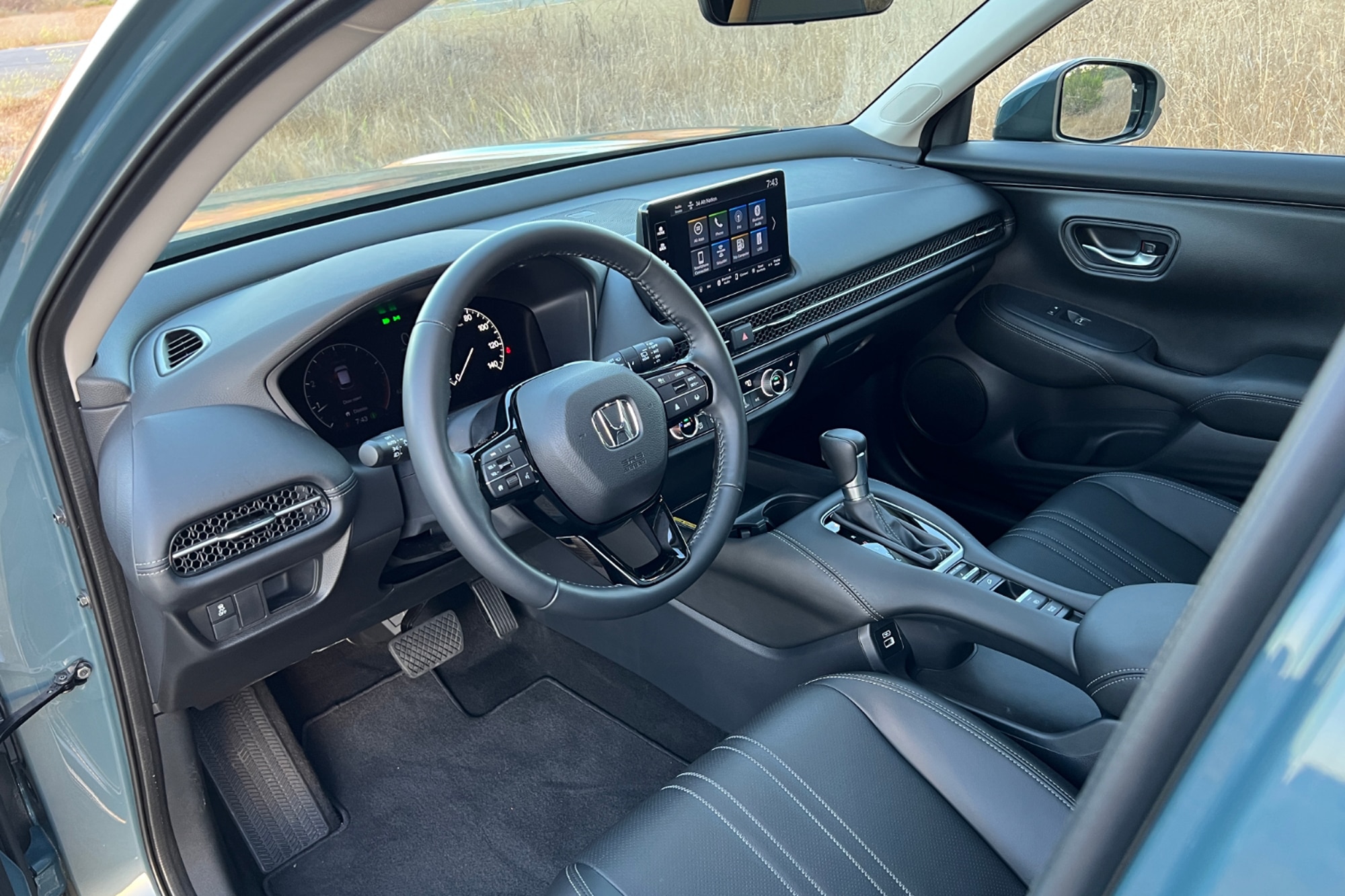 Christian Wardlaw
Christian Wardlaw
Back-seat passengers are not as lucky. The bottom seat cushion offers decent leg support, but the backrest angle forces a slouched seating position which my teenagers liked, but I did not. Hard plastic is the rule in the rear seating area, and the HR-V lacks air conditioning vents and rear USB charging ports. Aside from a bottle holder, a single front seatback pocket, and a smattering of small trays, there isn’t much storage back there, either.
The new HR-V also ditches the previous-generation model’s Magic Seat design. Since Honda based the old HR-V on the Fit subcompact hatchback, it adopted that car’s ability to tumble and fold the back seats to create a huge, cube-shaped cargo compartment or to flip the rear cushions up to create a tall space on the floor behind the front seats. However, a Honda spokesperson told me that internal research showed that people didn’t need that feature, so the new HR-V doesn’t have it.
Despite the HR-V’s increased size, cargo space is about the same. Behind the 60/40-split folding rear seats, the new HR-V supplies 24.4 cu.-ft. of volume (23.2 cu.-ft. with AWD), nearly identical to the old model. With the back seats folded down, the new HR-V has 58.8 cu.-ft. of cargo space (55.9 cu.-ft. with AWD), slightly more than the old model. Handy storage compartments under the load floor will undoubtedly prove helpful.
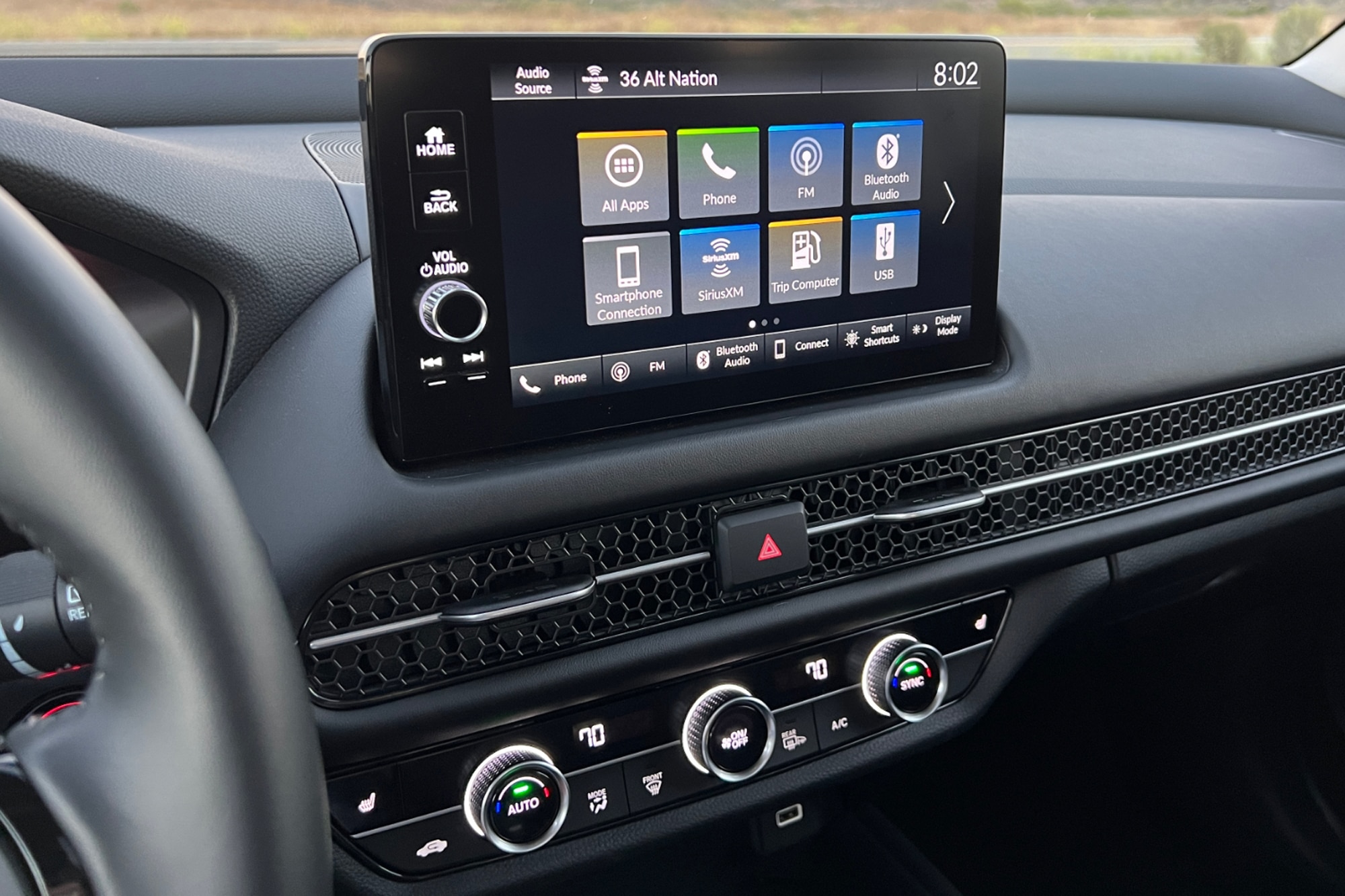 Christian Wardlaw
Christian Wardlaw
2023 Honda HR-V Review: The Technology
Among its numerous changes, the new HR-V’s technological leap into the present is its most significant improvement. Of course, you must buy the most expensive EX-L trim level to get the latest tech goodies. But even the base HR-V LX and mid-grade HR-V Sport receive significant upgrades.
For example, a 7-inch digital instrumentation display is standard and, with LX and Sport trim, pairs with a 7-inch color touchscreen infotainment display mounted at the top of the dashboard, where it is easy to see and reach. In addition, Bluetooth connectivity with streaming capability, text-messaging support, Apple CarPlay, Android Auto, and three 2.5-amp fast-charging USB ports are standard with LX and Sport trim, and the latter upgrades the stereo to six speakers from four.
Choose the HR-V EX-L, and the SUV comes with a larger 9-inch touchscreen display, wireless Apple CarPlay and Android Auto connectivity, SiriusXM satellite radio, HD Radio, and an eight-speaker stereo. Honda also installs a wireless smartphone charger in the EX-L model.
At this price point, the EX-L’s infotainment system is excellent. Connecting via Bluetooth is fast and easy, and I had no trouble using the voice recognition system to select artists or stations on Apple Music, making or receiving phone calls, getting directions to nearby coffee shops and restaurants, etc. The volume knob and small tuning buttons underneath it make it easy to adjust the stereo, and the EX-L’s eight-speaker sound system is surprisingly good.
Better yet, the HR-V benefits from numerous safety improvements. For example, it uses next-generation Advanced Compatibility Engineering (ACE), which is what Honda calls its approach to structural safety and how the SUV’s architecture absorbs and deflects crash energy in a collision. Honda backs up the ACE structure with new airbag designs that the automaker says will suppress head rotation in an accident to reduce head injuries. Additionally, the new HR-V comes with ten airbags, adding new front knee and rear side-impact protection for 2023.
The previous-generation HR-V had a standard Honda Sensing collection of driving assistance and collision avoidance systems. For 2023, Honda upgrades to a new wide-view front camera while adding eight ultrasonic sonar sensors to the front and rear of the SUV. Together, these components improve Honda Sensing’s accuracy, smoothness, and overall performance while allowing Honda to expand the menu of safety features.
New standard features include automatic high-beam headlights, a rear-seat reminder, a traffic sign reader, and Traffic Jam Assist (TJA). The TJA system combines adaptive cruise control with lane-centering assistance at lower speeds to take some of the stress out of the daily commute. In addition, Sport trim adds a blind-spot monitoring system with rear cross-traffic alert, and EX-L trim comes with front and rear parking sensors and an exclusive low-speed braking function to prevent bumper bumps in traffic or while parking.
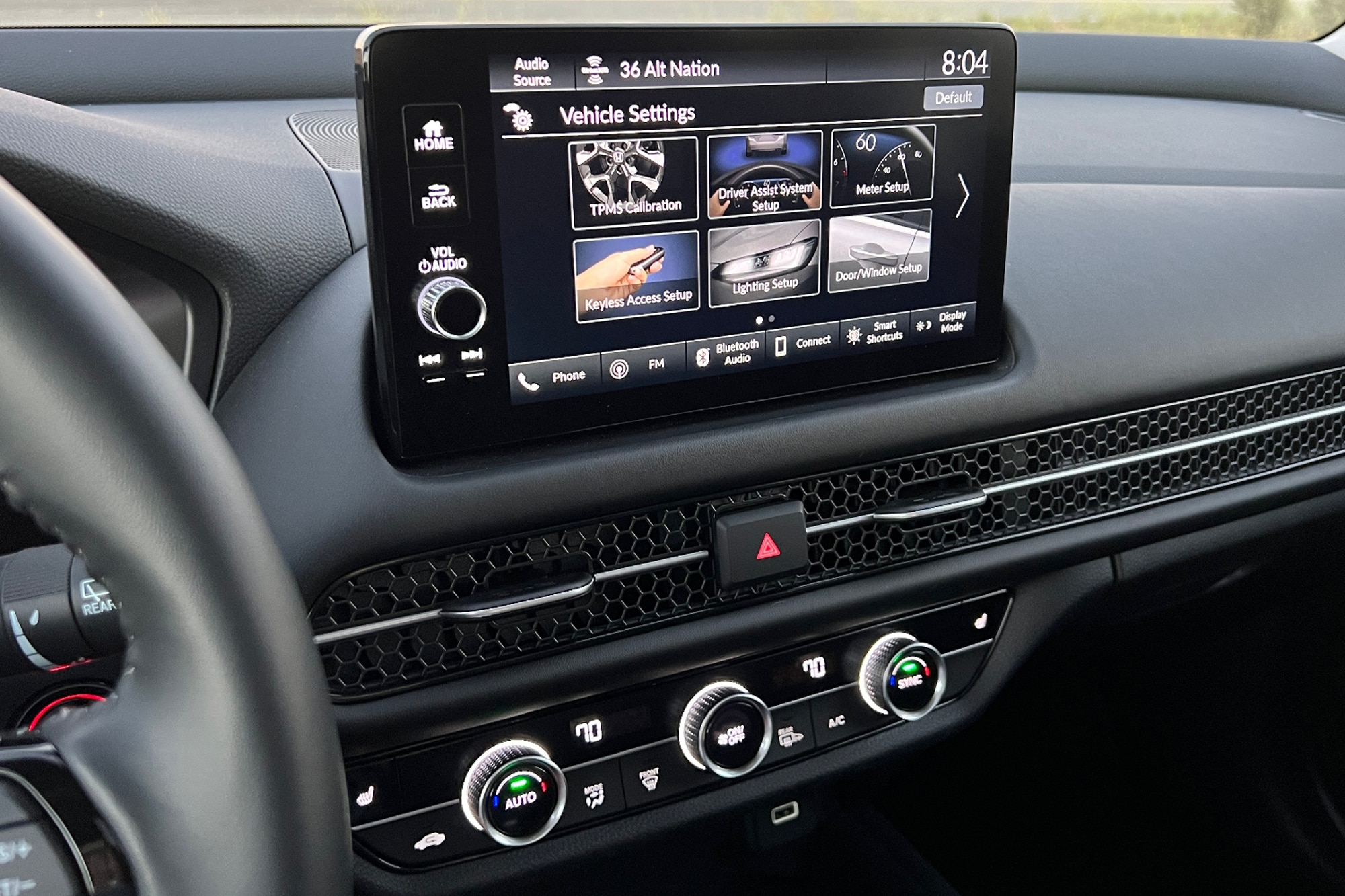 Christian Wardlaw
Christian Wardlaw
Unfortunately, I did not get to examine the TJA system in heavy traffic. However, in moderate traffic moving at speeds between 35 and 50 mph, with the adaptive cruise control following distance adjusted to a middle setting, Honda Sensing proved reasonably smooth. Unfortunately, on a few occasions, when other vehicles tucked into the gap ahead, Honda Sensing’s reaction time was a bit delayed, resulting in unnecessarily urgent braking.
On a rural freeway with two lanes of traffic heading in either direction, the adaptive cruise control and lane-centering system were in their element, and the technology successfully ignored exit ramps as I cruised along in the right lane. However, in an urban environment on a multi-lane freeway that had recently undergone construction, Honda Sensing perceived pavement scars as lane markers and briefly attempted to steer the HR-V out of the lane.
Also, on the curves of Pacific Coast Highway, if I put a wheel on the double-yellow dividing line and activated the lane-departure warning and lane-keeping systems, the technology tended to want to “hug” the paint rather than respond to my gentle steering corrections. The lane-departure warning system uses a steering wheel wobble to tell drivers they are crossing a line, and while it is more subtle than in the past, I still prefer a steering wheel vibration.
Overall, the HR-V’s new Honda Sensing collection of safety features is more accurate, refined, and confidence-inspiring than before. However, it can occasionally get on a driver’s nerves, so further work is necessary to perfect the tech.
As for the 2023 Honda HR-V crash-test ratings, the jury remains out as I write this review. Neither the National Highway Traffic Safety Administration (NHTSA) nor the Insurance Institute for Highway Safety (IIHS) has performed testing on the redesigned SUV.
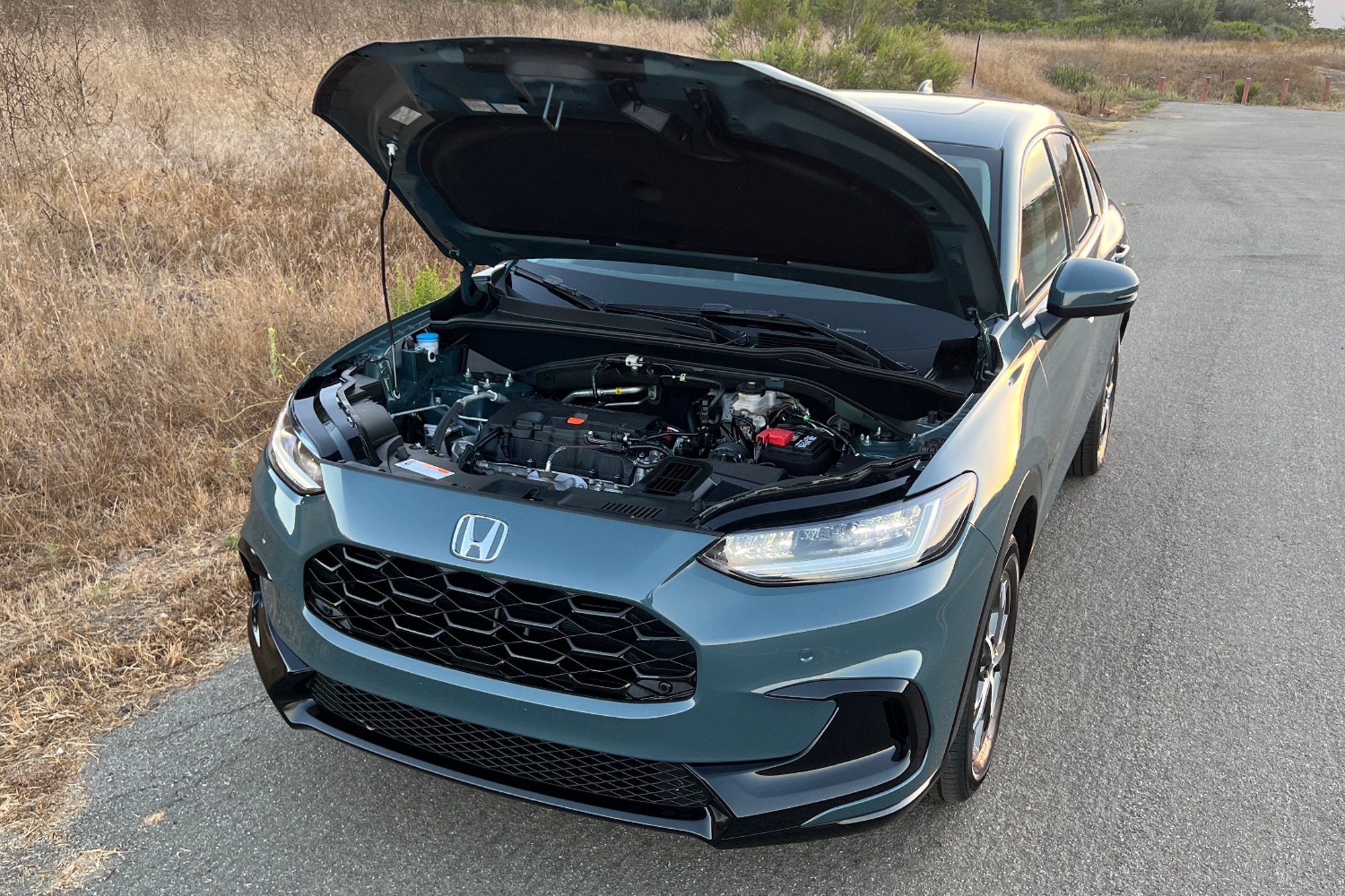 Christian Wardlaw
Christian Wardlaw
2023 Honda HR-V Review: The Drive
Honda’s most significant error with the redesigned 2023 HR-V is the powertrain. The SUV gains a couple of hundred pounds compared to the old model, which already struggled to accelerate out of its own way. So the new HR-V adopts the same 2.0L four-cylinder engine you’ll find in the Honda Civic, which makes 158 hp and 138 lb.-ft. of torque. These figures represent gains of 17 hp and 11 lb.-ft. over the previous-generation HR-V, but the SUV’s weight gain erases any benefit they might provide.
In addition, Honda saddles the engine with a continuously variable transmission that is not shy about announcing its displeasure when you’re accelerating to get onto a freeway, up a mountain grade, or around slower traffic. Honda says the CVT features Step-Shift programming and other software tricks to make it sound and feel more natural, and these work 90 percent of the time. Unfortunately, the other 10% of the time, it sounds like the engine is screaming in pain.
Acceleration is leisurely, and that’s at sea level. Drive a Honda HR-V into the mountains, and in addition to the wailing coming from the powertrain, it will likely feel strangled in the thinner atmosphere. Of course, this is also true of many of the HR-V’s competitors. Others, however, offer turbocharging to solve the torque and elevation problems. This new Honda needs the 1.5L turbo-four found in the Civic or a hybrid powertrain that employs an electric motor to supply some extra motivational oomph while improving fuel economy.
Because HR-V drivers will frequently need to push hard on the accelerator pedal to get the SUV moving at something more than a snail’s pace, owners will likely suffer disappointment with the gas mileage. According to the EPA, the new HR-V should return 27 mpg (AWD) or 28 mpg (FWD) in combined driving, numbers that are lower than the previous-generation model. On my testing loop, the HR-V EX-L AWD averaged 25.2 mpg while using the Normal driving mode and briefly sampling the mostly ineffective Sport transmission mode. The other driving mode choices include Econ and Snow.
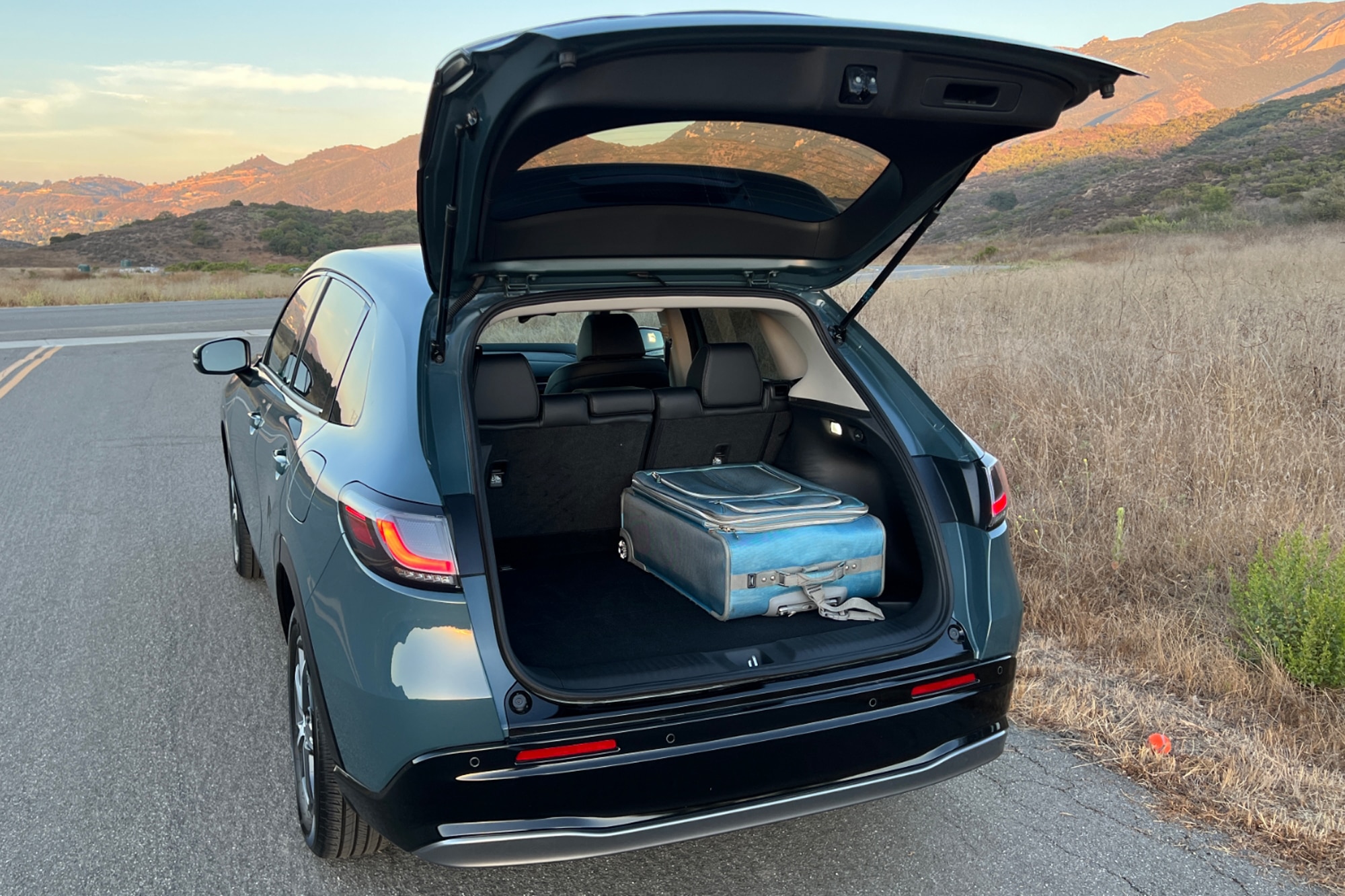 Christian Wardlaw
Christian Wardlaw
Powertrain aside, the new HR-V’s driving dynamics are much improved. The SUV handles well on a four-wheel independent suspension and P215/60R17 Hankook Kinergy GT all-season tires, the Civic-sourced steering feels terrific in your hands, and the brake pedal feels natural underfoot and is easy to modulate. So, you can hustle along a favorite back road with ease and maintain precious momentum. However, Honda has dialed in softness to the ride, and on undulating pavement, the HR-V can gently rock laterally and float vertically.
The new HR-V’s structural improvements and soft suspension pay dividends in urban driving environments. I took a set of local speed humps at 35 mph without any trouble, and the smaller, sharper speed bumps at a local shopping center revealed how much stiffer the new platform is. Bumps, holes, cracks, and dips don’t faze the new HR-V. On the highway, the SUV is much quieter than I expected, displaying reductions in wind and road noise, which adds to its more refined and sophisticated overall driving dynamics.
But that powertrain, though. It’s a severe misstep, making me think you’d be happier owning a Honda Civic Hatchback with EX-L or Sport Touring trim. I know I would be.
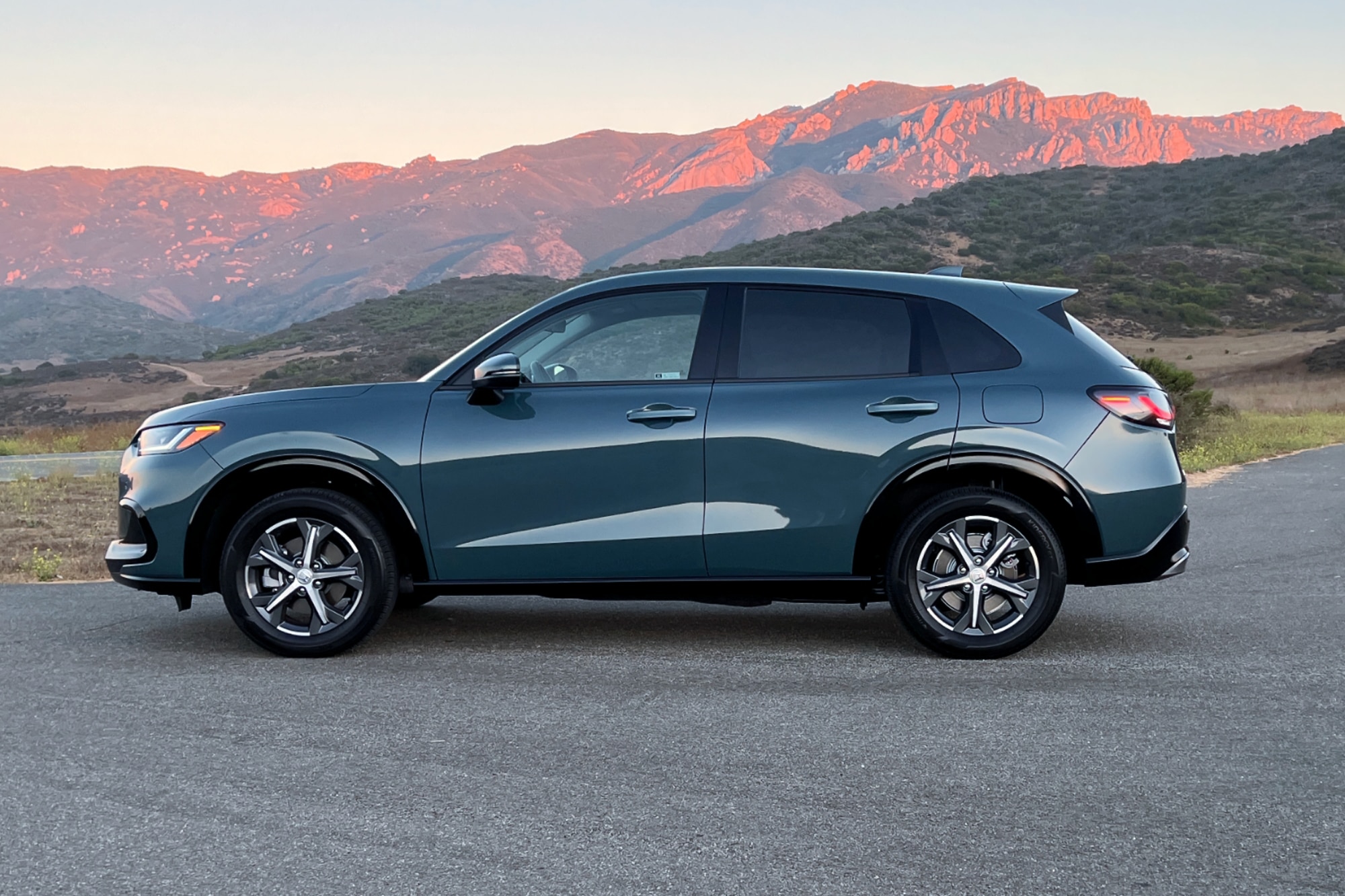 Christian Wardlaw
Christian Wardlaw
Is the 2023 Honda HR-V a Good SUV?
Measured against its competitive set, the redesigned Honda HR-V brings plenty to the table. It looks and feels all grown up and is far more technologically sophisticated than before. The ride and handling are almost perfect for this type of vehicle, too, and it offers commendable levels of comfort and cargo space. However, the acceleration and fuel economy disappoint, and with just seven inches of ground clearance and a relatively simple AWD system, the HR-V isn’t good for going off-road. For these reasons, a turbocharged Honda Civic Hatchback might prove more satisfying over the long run.
Written by humans.
Edited by humans.
 Christian Wardlaw
Christian WardlawMy first word was “car.” That’s what I’m told, anyway. For as long as I can remember, I’ve been obsessed with them. The design. The engineering. The performance. And the purpose. I’m a car enthusiast who loves to drive, but I’m also most interested in the cars, trucks, and SUVs that people actually buy. Anybody can tell you that a sports car is fast. What you need to know is whether or not you should buy that new SUV, and why. My life purpose is to help you make that decision.
Related articles
View more related articles